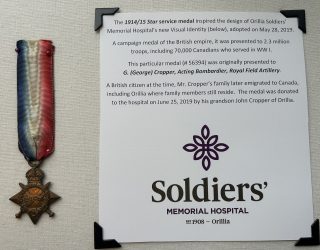Community Update – Couchiching Ontario Health Team
Over two years ago, the Ontario Government introduced a new concept for integrated health care and enhanced system navigation. This new model of care was introduced as “Ontario Health Teams”, with the overall goal of working with patients, families and service providers to co-design an integrated health care system, allowing for easier system navigation and enhanced transitions between providers.
With a positive reputation for collaborative working relationships, the Couchiching region was successful in establishing one of the first OHTs in the Province; now known as the “Couchiching Ontario Health Team”. The Couchiching Ontario Health Team (Couchiching OHT) is comprised of over 20 organizations spread throughout Orillia, Oro-Medonte, Ramara, Severn and Rama First Nations. These committed organizations are working together to improve patient outcomes by coordinating all aspects of health promotion, disease prevention and integrated care as a unified Team.
As we progressively emerge out of COVID-19 pandemic, we are able to redirect efforts back to enhancing the concept of seamless, integrated care for our region. For patients, families and care givers, this will mean easier access to services, more effective communication amongst providers and enhanced health outcomes.
The transition in the overall health system to a team based model, does require time to allow for system transformation to occur. The Couchiching OHT has been working diligently throughout the pandemic to facilitate services such as COVID-19 testing, vaccination, virtual care and will continue to develop this innovative model of care to address the needs of our community.
The following Question and Answer section aims to provide additional information on how the Couchiching OHT is progressing.
Who are the Couchiching OHT members?
The Couchiching OHT is comprised of a variety of core partners and affiliate support members. Our overall membership includes representation from: acute care, primary care, palliative care, home and community care, long-term care, retirement homes, community support services, paramedicine, mental health and addictions, varying levels of government, indigenous service partners and more. For a full list of partners, please refer to the list below:
- 211
- Barrie Area Native Advisory Circle (BANAC)
- Bayshore Home Health
- Canadian Mental Health Association
- CarePartners*
- City of Orillia
- Couchiching Family Health Team*
- County of Simcoe (Health & Emergency Services)*
- Dentists
- Empower Simcoe
- Entite 4
- Geriatric Outreach Clinic
- Green Haven
- Health System Performance Network
- Healthline
- Helping Hands*
- Home and Community Care Support Services NSM
- Huronia Nurse Practitioner Led Clinic*
- Lighthouse
- Leap of Faith Together (LOFT)
- Mariposa House Hospice
- Ministry of Children, Community and Social Services
- North Simcoe Muskoka Hospice Palliative Care Network
- Oak Terrace Nursing Home (Revera Inc.)
- Ontario Health (Central Region)
- Ontario Telemedicine Network
- Ontario Works. County of Simcoe
- Orillia Soldiers’ Memorial Hospital*
- ProResp*
- Rama First Nation
- Severn Township
- North Simcoe Muskoka – Specialized Geriatric Services (NSM SGS)
- Simcoe Muskoka District Health Unit (SMDHU)
- Township of Oro-Medonte
- Victoria Order of Nurses
*Denotes Anchor Partner
What is the Purpose of the Couchiching OHT?
One of the first steps in the formation of the Couchiching OHT was to create a shared purpose amongst our partner organizations. With feedback from many organizational leaders, staff, patients and caregivers the following shared purpose statement was created:
We are one community that is committed to improving health and wellbeing. Together, we will achieve our goal through system co-design in a culturally safe and meaningful way. “All my relations”.
There are several important elements to our shared purpose. We are committed to improving health, not just treating illness alone. Taking a holistic approach to all aspects of wellbeing is critical. The Couchiching OHT will co-design the system with patients, clients, families and caregivers in a way that makes sense to those who need the services. We value relationships and inclusivity, building off the strengths of our partners. The Indigenous saying, “Mitakuye-Oyasin” translated as “all my relations”, reflects how we are all connected.
What are some of the examples of the work done to date?
The Couchiching OHT has identified several key areas of focus although there are efforts underway to integrate care for a number of populations. We are committed to engaging our community as this work evolves.
Supporting Our Vulnerable Communities
The Couchiching OHT, Social Determinants of Health (SDOH) working group is a very diverse group of social service agencies, local shelters, food bank, community minded individuals, Indigenous health leaders and municipal leaders who meet regularly to address the needs of the most vulnerable in our community. This includes individuals facing housing and food insecurity, inclusive of those suffering with addiction and mental health disorders and any community members or groups in need.
During COVID-19, this group was called upon to provide innovative ways of providing testing and vaccinations to those who might not otherwise have access. Innovative ideas and partnerships between agencies arose to enhance outreach services and temporary “pop-up” clinics to address the need for outreach based testing and vaccination.
The SDOH working group continues to provide leadership and remains committed to supporting the new medical centre at the Lighthouse with patient and programming support, advocating and applying for any additional funding for affordable housing and pursuing a more integrated local system for mental health and addiction care services.
What are some of the key priorities going forwards?
The Couchiching OHT is focused on improving health service challenges that face patients, families and caregivers. Recognizing that navigation of the complex healthcare system can be overwhelming for individuals, the Couchiching OHT aims to create fewer, seamless points of entry for people to access and navigate care.
Enhancing communication between providers is also an important goal of all Ontario Health Teams. Currently, an individual’s health record is not easily shared between providers, requiring additional work for patients and their providers to share important information. Having a single, comprehensive care plan that can be access by patients, caregivers and providers will be an important step forward to enhancing patient care and communication.
How can you participate as a patient, family or caregiver?
Creating an integrated health care system requires significant change in the way we look at health and wellness in our community. Our goal is to transform our system with patients, families and caregivers as partners.
The Couchiching OHT has formed a Patient and Family Advisory Council (PFAC) to determine the needs of residents in Orillia, Oro-Medonte, Severn, Ramara and Rama First Nations. The purpose of the PFAC is to make recommendations on matters that impact the experience of patients, caregivers and families, and to work with the Couchiching OHT to shape and redesign seamless healthcare services to meet to needs of the Couchiching area. The role of the PFAC is to advance patient engagement and patient-centered care in all services provided by the Couchiching OHT, provide a forum for patients, caregivers and families to identify opportunities to improve the quality of care and to promote opportunities for collaboration among patients, caregivers, families and members of the Couchiching OHT.
The PFAC is a group of volunteers who are not part of the health care system who are seeking members from the community to ensure a diverse and inclusive advisory council. Members are not required to have a background in health care, rather volunteers should be a patient, family member or caregiver who has accessed healthcare services in the Couchiching area during the past five (5) years.
If you are interested in participating in change and being part of the PFAC, please send an email to j.hicks@cfht.ca or call 705-329-3649 ext. 202.
-
Joint Release - Royal Canadian Legion Branch 34 and OSMH Joint Media Release (Orillia, ON) The Royal Canadian Legion Branch 34 and Orillia Soldiers’ Memorial Hospital (OSMH) ...
![Joint Release - Royal Canadian Legion Branch 34 and OSMH]()
-
Letter to the Community Letter to the Community In response to a recent article regarding potential changes to the Board Composition ...
![Letter to the Community]()
-
Lakehead University selected as preferred site for new Orillia hospital Orillia, ON – In a historic announcement with the potential to profoundly advance access to quality healthcare and ...
![Lakehead University selected as preferred site for new Orillia hospital]()


